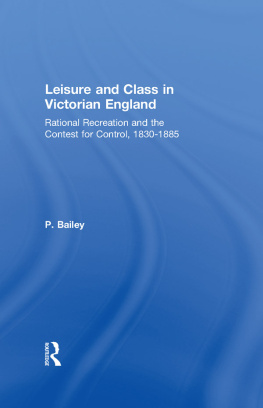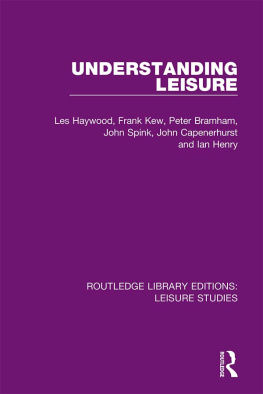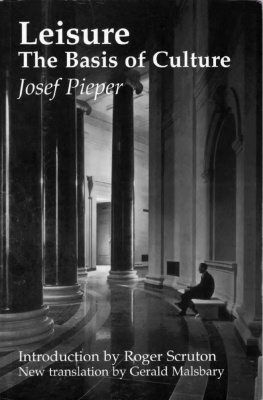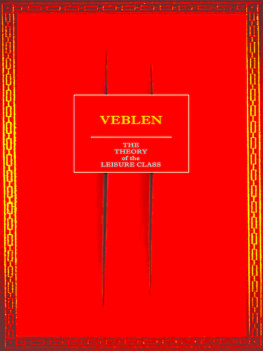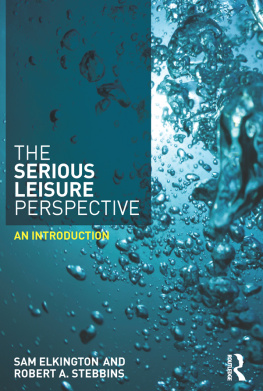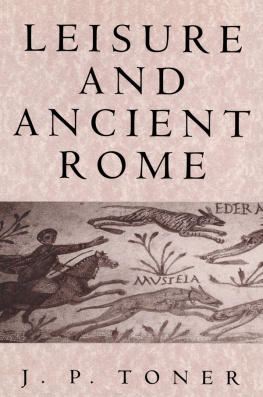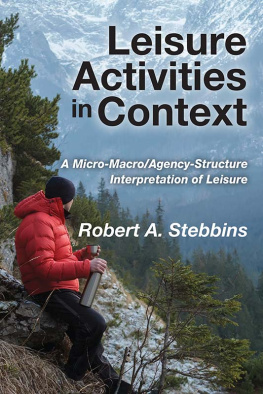ROUTLEDGE LIBRARY EDITIONS: THE VICTORIAN WORLD
Volume 12
LEISURE IN THE INDUSTRIAL REVOLUTION
LEISURE IN THE INDUSTRIAL REVOLUTION
c. 1780-c. 1880
HUGH CUNNINGHAM
First published in 1980 by Croom Helm Ltd
This edition first published in 2016
by Routledge
2 Park Square, Milton Park, Abingdon, Oxon OX14 4RN
and by Routledge
711 Third Avenue, New York, NY 10017
Routledge is an imprint of the Taylor & Francis Group, an informa business
1980 Hugh Cunningham
All rights reserved. No part of this book may be reprinted or reproduced or utilised in any form or by any electronic, mechanical, or other means, now known or hereafter invented, including photocopying and recording, or in any information storage or retrieval system, without permission in writing from the publishers.
Trademark notice: Product or corporate names may be trademarks or registered trademarks, and are used only for identification and explanation without intent to infringe.
British Library Cataloguing in Publication Data
A catalogue record for this book is available from the British Library
ISBN: 978-1-138-66565-1 (Set)
ISBN: 978-1-315-61965-1 (Set) (ebk)
ISBN: 978-1-138-63864-8 (Volume 12) (hbk)
ISBN: 978-1-315-63767-9 (Volume 12) (ebk)
Publishers Note
The publisher has gone to great lengths to ensure the quality of this reprint but points out that some imperfections in the original copies may be apparent.
Disclaimer
The publisher has made every effort to trace copyright holders and would welcome correspondence from those they have been unable to trace.
Leisure in the Industrial Revolution
c. 1780-c. 1880
Hugh Cunningham
1980 Hugh Cunningham
Croom Helm Ltd, 2-10 St Johns Road, London SW11
British Library Cataloguing in Publication Data
Cunningham, Hugh
Leisure in the Industrial Revolution, c. 1780-c. 1880
1. Leisure Great Britain history
I. Title
301.570941 GV75
ISBN 0-85664-398-X
ISBN 0-7099-0425-8 Pbk
Printed in Great Britain by
Biddles Ltd, Guildford, Surrey
CONTENTS
I first developed some of the ideas presented in this book in papers given at the University of Kent at Canterbury, the Institute of Historical Research in London, the University of Colorado at Denver, and the 1979 Conference of the Pacific Coast Branch of the British Studies Conference, and of the Mid-West Victorian Studies Association. My thanks to all those who commented so helpfully on those occasions. Over the years I have received much stimulus from students at the University of Kent who have taken the course, Leisure in the Industrial Revolution. Many others have assisted in various ways, in particular Louis James without whom I would not have developed the theme of , and my wife, Diane, who has helped me to clarify both argument and expression. Neither is in any way responsible for the outcome.
Ten years ago it would have been almost impossible to have written a book of this kind. With a few honourable exceptions, the history of leisure had been ignored by historians. Some of the secondary works that did exist, most of them by amateur historians, were of a very high quality, but on such subjects as music-hall or the seaside there was a mass of repetitious and unverifiable writing, and on other subjects there was nothing. On some there is still nothing. But in the last decade the output of writing on the history of leisure has been enormous, and my first and modest intention was to attempt a balanced survey of it. But the more I studied the more unhappy I became about many of the ideas which have informed our understanding of the history of leisure since the later eighteenth century. As a result the book has taken on an argumentative and assertive tone and I hope it has also become more interesting. It may help the reader to be aware at this stage of the kind of conclusions I have reached, and of the extent to which they differ from much current thinking on the history of leisure.
The writings of other historians had led me to expect that for popular leisure the first half-century or so of the Industrial Revolution, from about 1780 to 1840, would be a period of gloom during which the combined forces of evangelicalism, industrialism and urbanisation were brought to bear on the traditional, pre-industrial recreations of the people; and that the result was a vacuum. [B]y the 1840s, writes R.J. Morris, only chapel and public house filled the gloomy gap between bearbaiting and the maypole on one hand and association football and the music hall on the other.1 In fact I have come to see this half-century as one of vigorous growth of popular leisure and of a commercialisation of it comparable to the commercialisation of leisure for the middle class in the eighteenth century which Professor Plumb has identified.2 This conclusion, I have become aware, has made me a candidate for the unwelcome embrace of the optimist school of historians; I see it myself as a confirmation of the argument of E.P. Thompson that the people had some capacity to make their own culture.
This first conclusion made me suspicious of the structure of much thinking and writing about the impact of the Industrial Revolution on the culture of the people. Many historians of the nineteenth century write on the implicit assumption that society before the Industrial Revolution may be satisfactorily described in some such terms as traditional, pre-industrial or the old society, and that with the Industrial Revolution we move into a period of rapid modernisation; there are, it is admitted, some pre-industrial survivals but all of these are doomed to oblivion. This essentially whiggish habit of thinking is thoroughly disabling, and the outcome is a failure to examine difficult questions about the context of popular culture. Let me give an example. In his recent Leisure and Society 18301950 James Walvin describes the ratting which was so popular in mid-nineteenth-century London, and concludes: Yet these were the years of the railways and the Great Exhibition a reminder of the strong survival of pre-industrial recreations in a rapidly modernising society. Earlier in the same paragraph Walvin describes the ratting as a revival, a word with very different implications than survival, and one which invites one to ask why ratting should have enjoyed such popularity at that particular time in the worlds greatest centre of population; once that question is asked it is no longer possible to dismiss ratting as yet another, if rather horrific, pre-industrial survival.3 The ratting example may help to make a further point. The pre-industrial is often equated with the rural. Urbanisation therefore becomes a major agent of change. Yet here we have pre-industrial ratting in a manifestly urban environment. The kind of thinking which envisages a shift from rural pre-industrial to urban industrial and modern society once again, in its abstractness, leads to an evasion of difficult questions; questions which I have attempted, at least, to pose in this book. Put simply I have been less impressed than many other historians by the explanatory power of the distinction between town and country for an understanding of the history of leisure.


